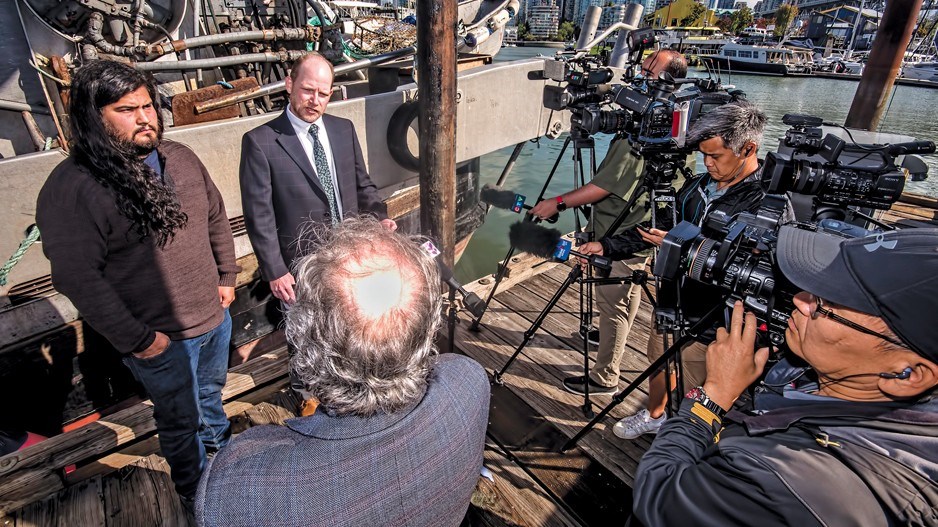Whichever party forms the next government in Canada, dealing with the devastating impacts of a closure of the commercial salmon fishery in B.C. this year should be an urgent priority, say commercial fishermen.
“The industry needs immediate relief,” said Arthur Black, a seine fisherman who took part last week in a foiled attempt at a protest flotilla.
The flotilla of commercial fishing boats was to converge on False Creek harbour to try to raise public awareness about their plight, but winds prevented most boats from getting there.
Those who did make it to False Creek said their livelihoods have been threatened by a fiat issued by federal Fisheries and Oceans Minister Bernadette Jordan that closed about 60% of the fishery to commercial fishermen.
“At the swipe of a pen, the minister took all these fisheries off the table and eliminated the income for all these fishermen,” said Andy Olson, executive director of the Native Fishing Association. “It was clearly politically motivated.
“There’s an election this year, and they felt that they could get some political ground by making this decision and making it seem like they were protecting salmon. Well they didn’t protect the salmon from all the recreational fishers. Those fisheries still happened.”
Greg Taylor, senior fisheries adviser for Watershed Watch Salmon Society, defended DFO’s decision, saying the closures were necessary to protect declining salmon stocks. He criticized DFO fisheries managers for going “rogue” last week when they announced a commercial opening for Fraser River pink salmon.
“The Fraser River commercial pink salmon fishery will catch sockeye and steelhead from several populations classified as endangered by the Committee on the Status of Endangered Wildlife in Canada,” he warned.
Commercial fishermen have been largely shut out of B.C.’s sockeye salmon fishery in the past, but this year’s closure has been particularly devastating. They spent thousands of dollars gearing up for a fishing season that was cancelled at the last minute.
Mike Emes, a gillnet fisherman, and his crew went from False Creek to Port Neville in late July, expecting there would be an opening on the Nass and Skeena rivers — based on test fisheries — but no sooner had they arrived when he learned the fisheries minister had closed the fishery. He came back with nothing but debt.
“My gross stock is going to be zero, and I spent probably at least $5,000 getting ready to go fishing, and put a thousand bucks worth of fuel in the boat,” Emes said.
Added Olson, “Some of these fishermen are going to lose $50,000 to $100,000 just this year in opportunity.”
The federal government has offered a licence buyback program, but it doesn’t help boat owners who don’t own licences. Some boat owners fish for corporate or First Nations licence holders.
It’s the boat owners who incur the expense of gearing up for fishing season and end up deep in debt.
“They have nothing to sell back to the government,” Olson said. “They’re left with nothing but a boat that doesn’t get to go fishing anymore because the government has closed those opportunities to them.”
Those boat owners who own licences say the federal government is not offering them enough to cover their investments over the years.
“I put my licence in the buyback for the last two years, and they have not accepted my [offer], and I felt my offer was low,” Emes said
James Lawson owns a seine boat, but doesn’t own the licence, so there is no buyback option for him. This year, he bought a gillnet boat and a licence.
“Between that and getting my seine net ready for the north season, I started behind almost $70,000, and at the last second I found out I’m not going to be able to fish,” he said.
What frustrates Lawson is that there has been no offer of help for fishermen like him, who spend thousands of dollars gearing up for a fishing season that gets cancelled, leaving him with no way to earn a living.
“They know they’re unemploying us, and they’re totally unwilling to start a labour force adjustment program.”
Lawson said Ottawa needs a long-term fix for the way licensing works in B.C.
During the federal election campaign, the Green Party suggested fleet separation policies, similar to those in Atlantic Canada, in which licences are tied to boats.
“We do think it’s part of the solution in B.C.,” Lawson said of the fleet separation proposal.
Though Taylor supports closures to protect wild salmon stocks, he also thinks Ottawa should be coming to the aid of the commercial fishermen who are suffering as a result of the closures.
“We support appropriate compensation for commercial fishers,” he said. “The closures are driven largely by climate change, habitat loss and salmon mismanagement, a consequence of the collective failure to protect wild salmon.”



